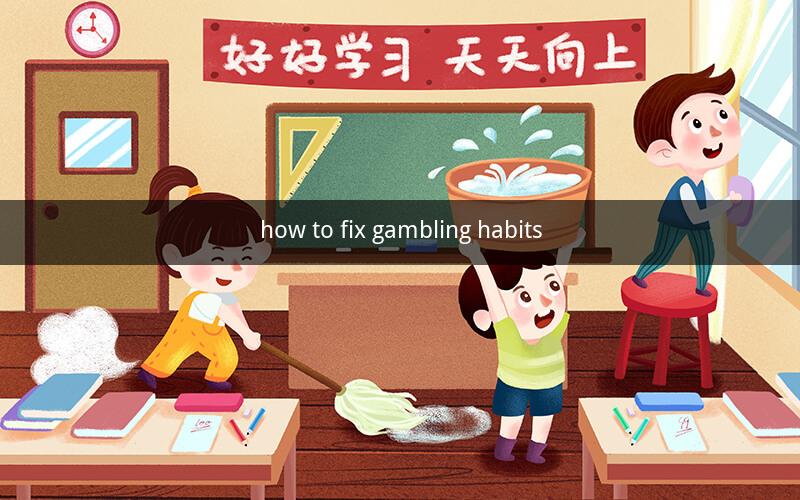
How to Fix Gambling Habits
Table of Contents
1. Understanding the Problem
2. Identifying the Underlying Causes
3. Seeking Professional Help
4. Developing a Support System
5. Setting Realistic Goals
6. Creating a Budget
7. Avoiding Triggers
8. Using Self-Exclusion Tools
9. Learning Coping Skills
10. Maintaining Sobriety
1. Understanding the Problem
Gambling habits can lead to serious consequences, including financial, emotional, and social problems. It is crucial to understand the nature of the problem before attempting to fix it. Gambling addiction is characterized by an inability to control the urge to gamble, despite negative consequences. Recognizing the signs of a gambling problem is the first step towards overcoming it.
2. Identifying the Underlying Causes
Identifying the underlying causes of gambling habits is essential for effective treatment. Common causes include:
- Financial stress or debt
- Emotional or psychological issues, such as depression or anxiety
- Social factors, such as peer pressure or a desire for status
Understanding the root causes can help develop personalized strategies for overcoming the addiction.
3. Seeking Professional Help
Professional help can be invaluable in addressing gambling habits. Therapists, counselors, and addiction specialists can provide personalized guidance and support. Treatment options may include:
- Cognitive-behavioral therapy (CBT)
- Family therapy
- Support groups
- Residential or outpatient programs
4. Developing a Support System
Building a strong support system is crucial for overcoming gambling habits. This can include family, friends, or support groups. Sharing experiences and receiving encouragement from others who have faced similar challenges can be incredibly beneficial.
5. Setting Realistic Goals
Setting realistic goals is essential for maintaining motivation and progress. Start by setting small, achievable goals, such as:
- Reducing the amount of money spent on gambling
- Limiting the frequency of gambling activities
- Establishing a healthy routine
6. Creating a Budget
Creating a budget can help manage finances and reduce the temptation to gamble. Allocate a specific amount of money for entertainment and stick to it. Avoid using credit cards or loans to fund gambling activities.
7. Avoiding Triggers
Identifying and avoiding triggers is crucial for maintaining sobriety. Triggers can include:
- Visiting casinos or gambling websites
- Engaging in social activities involving gambling
- Watching gambling-related media
Develop strategies to avoid these triggers, such as:
- Uninstalling gambling apps or websites
- Staying away from casinos or similar venues
- Limiting exposure to gambling-related media
8. Using Self-Exclusion Tools
Many casinos and gambling websites offer self-exclusion tools to help individuals avoid temptation. These tools can restrict access to gambling venues or websites, making it easier to maintain sobriety.
9. Learning Coping Skills
Developing coping skills is essential for managing stress and avoiding relapse. Some effective coping strategies include:
- Exercise
- Mindfulness and meditation
- Engaging in hobbies or activities that provide fulfillment
10. Maintaining Sobriety
Maintaining sobriety is a lifelong process. Stay committed to your goals and continue seeking support from others. Remember that overcoming gambling habits is possible with dedication and perseverance.
Frequently Asked Questions
1. What are the signs of a gambling problem?
- Signs include lying about gambling activities, neglecting responsibilities, and experiencing financial, emotional, or social problems due to gambling.
2. How can I tell if I am addicted to gambling?
- If you find yourself preoccupied with gambling, losing control over your spending, and experiencing negative consequences as a result, you may be addicted.
3. Is it possible to overcome a gambling addiction on my own?
- While it is possible to overcome a gambling addiction without professional help, seeking support from others can significantly improve your chances of success.
4. What types of therapy are available for gambling addiction?
- Common treatments include cognitive-behavioral therapy (CBT), family therapy, and support groups.
5. How can I develop a strong support system?
- Reach out to family and friends, join support groups, or seek professional help to connect with others who understand your struggles.
6. What are some effective coping skills for managing stress?
- Exercise, mindfulness, meditation, and engaging in hobbies can help manage stress and reduce the temptation to gamble.
7. How can I create a budget to avoid gambling?
- Allocate a specific amount of money for entertainment and stick to it, avoiding credit cards and loans.
8. What are self-exclusion tools, and how do they help?
- Self-exclusion tools restrict access to gambling venues or websites, making it easier to maintain sobriety.
9. How long does it take to overcome a gambling addiction?
- The duration of recovery varies for each individual, but with dedication and support, it is possible to overcome the addiction.
10. Can I relapse after overcoming a gambling addiction?
- Yes, relapse is possible. However, with continued commitment and support, you can overcome relapse and maintain sobriety.